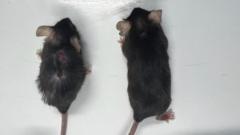A drug has increased the lifespans of laboratory animals by nearly 25%, in a discovery scientists hope can slow human ageing too. The treated mice were known as "supermodel grannies" in the lab because of their youthful appearance. They were healthier, stronger and developed fewer cancers than their unmedicated peers.
The drug is already being tested in people, but whether it would have the same anti-ageing effect is unknown. The quest for a longer life is woven through human history. However, scientists have long known the ageing process is malleable - laboratory animals live longer if you significantly cut the amount of food they eat.

Now the field of ageing-research is booming as researchers try to uncover - and manipulate - the molecular processes of ageing. The team at the MRC Laboratory of Medical Science, Imperial College London and Duke-NUS Medical School in Singapore were investigating a protein called interleukin-11. Levels of it increase in the human body as we get older, it contributes to higher levels of inflammation, and the researchers say it flips several biological switches that control the pace of ageing.
The researchers performed two experiments. The results, published in the journal Nature, showed lifespans were increased by 20-25% depending on the experiment and sex of the mice. Old laboratory mice often die from cancer, however, the mice lacking interleukin-11 had far lower levels of the disease.
And they showed improved muscle function, were leaner, had.























